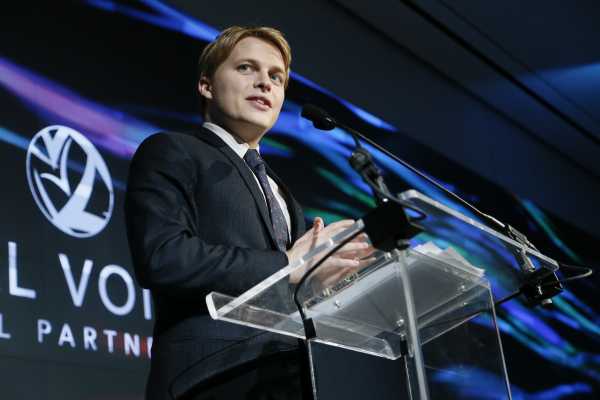
Did NBC News try to stop one of its reporters from working on a story about Harvey Weinstein’s alleged sexual harassment and abuse of women in Hollywood — the report that eventually helped kickstart the #MeToo movement?
The question has percolated since Ronan Farrow, one of the three reporters who broke the Weinstein story, published his investigation in the New Yorker in October 2017, days after Jodi Kantor and Megan Twohey published their report on the producer’s alleged sexual harassment and abuse in the New York Times. Farrow worked for NBC at the time, but the story ran in the New Yorker, and Farrow later left the network.
Now Farrow — who is working on a book, Catch and Kill, that is expected to recount how he got the Weinstein story to publication — and his allies are in a very public fight with NBC about whether the network tried to stop the story from ever coming out. A former producer for Farrow claimed that NBC had thrown up roadblocks to Farrow’s reporting in what the producer called “a massive breach of journalistic integrity.” NBC, for its part, claims the story literally wasn’t ready for primetime: that Farrow’s sourcing didn’t meet the bar for such an explosive allegation.
The back-and-forth has garnered so much attention that even President Donald Trump has weighed in. The president took aim at NBC in a tweet on Tuesday:
At its heart, the debate is partly about how the Weinstein story stayed an open secret for so long. Allegations and rumors about the producer had circulated for years, but reporters struggled to come up with anything firm enough to publish. There were many reasons for this: Women who speak up about sexual harassment do so at tremendous risk to themselves. Weinstein, as Farrow reported in November, actively tried to suppress the investigation, working with former Israeli intelligence agents from the firm Black Cube.
The allegations from Farrow’s producer suggest another contributing factor. NBC News might, as they claim, have been trying to handle the subject cautiously, with a process that’s more difficult for accusers than a print story. Farrow’s version of events suggests another explanation: that even a leading news organization balked at confronting the most powerful man in Hollywood.
NBC says the Weinstein story wasn’t ready for television. Farrow thought it was.
A few events aren’t in dispute: Farrow reported much of his story for NBC News, but the network didn’t ever run it. The conflict involving NBC News leadership, Farrow, and now a former producer revolves around why the network didn’t want to run Farrow’s story.
The debate erupted last week, when Rich McHugh, a former NBC News producer who worked closely with Farrow, said in an interview with the New York Times that the network had impeded Farrow’s reporting. He said NBC had been “resistant” throughout Farrow’s months-long reporting process and had, in effect, been responsible for “killing the Harvey Weinstein story.”
NBC News chair Andrew Lack pushed back forcefully on Monday evening, sending an email to staff members saying that Farrow’s reporting had not been “fit to broadcast” at the time and defending the network’s handling of the situation. “Contrary to recent allegations, at no point did NBC obstruct Farrow’s reporting or ‘kill’ an interview,” he said.
Lack also distributed a memo outlining a summary of the events and Farrow’s work, including Weinstein’s attempts to influence the investigation and a timeline.
Farrow responded that the memo “contains numerous false or misleading statements” in a statement issued on Twitter:
According to NBC News’s timeline, senior Today Show producer Noah Oppenheim pointed out that a tweet from actress Rose McGowan may have been a reference to misconduct by Weinstein in January 2017 and assigned Farrow the story. Farrow interviewed McGowan in February 2017, but NBC claims she never said Weinstein’s name on camera.
Then, according to NBC News, Farrow worked on the story for the next several months and in July 2017 submitted a draft script and digital story that relied “heavily” on McGowan. Beyond her, NBC said, there wasn’t anyone else who was willing to go on the record.
Farrow tried several times to revise the story, including scheduling a follow-up interview with McGowan that was later canceled; McGowan’s lawyers later sent him a cease-and-desist letter withdrawing permission to use the interview. He added already public allegations that Weinstein had groped model Ambra Gutierrez, and he obtained a recording the New York Police Department made in 2015 in which Weinstein admitted to the incident with Gutierrez.
In August 2017 and after months of reporting, the network claims, Farrow did not have “a single victim of — or witness to — misconduct by Weinstein who was willing to be identified.” The company said it convened a team of three veteran journalists who agreed it was not “a story that is ready for broadcast.”
Farrow argued on Monday that the story was “twice cleared and deemed ‘reportable’ by legal and standards only to be blocked by executives who refused to allow us to seek comment from Harvey Weinstein.”
Farrow and NBC disagree on who suggested he take the story elsewhere. (NBC says it was Farrow’s decision to pursue the story elsewhere; he says that the network suggested it.) But Farrow and the New Yorker reached an agreement in August. The magazine published his story five days after the Times published its Weinstein story in October 2017.
Farrow’s story in the New Yorker contained several named accusers, including Asia Argento, Mira Sorvino, Rosanna Arquette, Lucia Evans, Emma de Caunes, Jessica Barth, and Sophie Dix, who accused Weinstein of offenses ranging from flashing to rape. Its sourcing included 16 former and current executives and assistants at Weinstein’s companies.
NBC News and Farrow’s camp have different accounts of much of what happened
Part of Lack’s argument seems to be that there is a big difference between the accusers going on television to tell their stories and speaking to Farrow for a print story.
In his email to staffers, Lack said that seven women mentioned in Farrow’s New Yorker story were not mentioned in the reporting he presented to NBC News.
But one of Weinstein’s accusers, Emily Nestor, who was in the New Yorker story on the record, disputed NBC News’ assertion that no one was willing to speak publicly: She said in a statement she had filmed an interview in silhouette with Farrow, and that after McGowan pulled out of the story, “Farrow and I discussed and I had tentatively offered either to attach my name to the interview in silhouette or potentially even reshoot the interview with my face visible.” NBC News, she said, wasn’t interested.
“The implication that these ‘brave women’ were just not ‘brave’ enough to go in front of a TV crew undermines all of the dangers, uncertainties, and obstacles we faced in coming forward in the New Yorker piece,” she said.
An NBC News spokesperson countered, saying that a producer spoke with Nestor in mid-August and contemporaneous notes of the conversation do not reflect her saying she was willing to be named, nor has she said so since.
Megyn Kelly, who has her own news show on NBC, reported on Tuesday that McGowan and McHugh both say that McGowan did go on the record about Weinstein in February 2017, and that after the on-camera interview with Farrow she named Weinstein as her rapist.
An NBC News spokesperson also disputed that claim, saying that McGowan doesn’t mention Weinstein by name in the interview transcript from February 2017, and if she named him off-camera, Farrow didn’t submit that to his editors until July 23, which asserted the actress had named Weinstein “in subsequent conversations.” The spokesperson also suggested Farrow’s reporting in that transcript might not have been credible, as it included “several other assertions that quickly did not hold up to scrutiny.”
McHugh criticized NBC’s “fact sheet” and timeline as well. “When you have an exclusive audio recording of Harvey Weinstein admitting to sexual assault, in addition to a rape survivor scheduled for an interview in three days, what journalistic ‘ethic’ would cause a news outlet to cancel that interview, not air the audio tape, and let one of the most defining stories of this decade walk out the door?” he said.
The subtext of much of the dispute is whether NBC executives were perhaps trying to protect Weinstein
Both NBC and McHugh say Weinstein and his lawyers were aware of the reporting going on about his conduct and were aggressive in trying to head it off. The debate is, in part, about whether Weinstein succeeded.
McHugh told the Times that there were both internal and external obstacles to reporting the story and that Weinstein associates called him and others repeatedly: “I knew that Weinstein was calling NBC executives directly,” he said. “One time it even happened when we were in the room.”
NBC News’s memo describes “aggressive and persistent” attempts by Weinstein and his attorneys to contact multiple people at the network during the investigation and after. According to the memo, Weinstein and his representatives were “repeatedly told only that, if and when NBC News was prepared to run a story, they would be given the appropriate amount of time to respond.”
According to the memo, Weinstein called and emailed Lack on multiple occasions between April and September 2017, who initially told him he didn’t know what Weinstein was talking about and then rebuffed his attempts to talk.
It describes a series of interactions between Oppenheim and Weinstein in 2017, including them sitting together at a table during the Time 100 gala in April 2017, and a call Weinstein made to Oppenheim in which he “launched into a rambling assault on Rose McGowan’s credibility.” Weinstein also reached out to others at NBC News, but by the network’s account, he and his team were always rebuffed.
It’s hard to overstate the effects of the Harvey Weinstein story over the past year. Kantor and Twohey’s initial story in the New York Times was a blockbuster investigation. Farrow’s reporting, published a few days later, added more serious allegations and the names of several more accusers. In the wake of the exposés, the #MeToo movement took off, leading to revelations of accusations of sexual harassment and assault against dozens of powerful men in a wide range of fields.
Twohey, Kantor, and Farrow have been lauded for their work with some of the highest honors in journalism — Twohey and Kantor won the Pulitzer Prize, and the New Yorker won a National Magazine Award for Farrow’s work. Farrow went on to report for the magazine on allegations against New York Attorney General Eric Schneiderman and CBS chief executive Les Moonves, and he’s done multiple follow-up stories on Weinstein.
NBC, meanwhile, has been the subject of investigations of its own rather than the author of them: Today co-anchor Matt Lauer was ousted from NBC amid allegations of sexual misconduct and veteran anchor Tom Brokaw was accused of misconduct as well. Lack, who headed NBC’s news division from 1993 to 2001 and re-joined the network in 2015, has faced scrutiny over his handling of both Lauer’s and Brokaw’s cases.
But Lack isn’t defending his record of handling reports of sexual misconduct. He’s fighting the idea, put forward by McHugh, that NBC could have published one of the biggest investigative stories of the last decade and passed up on the opportunity.
With Farrow’s forthcoming book, this fight doesn’t seem likely to end anytime soon. McHugh told the Times he doesn’t believe NBC has “told the truth” about its handling of the matter. “That’s my opinion. I’ve asked that question, and to this day I still have not been given a good answer,” he said.
Sourse: vox.com




